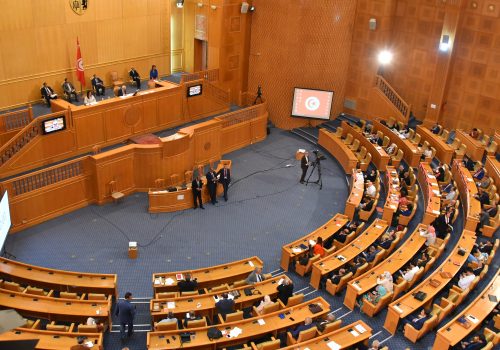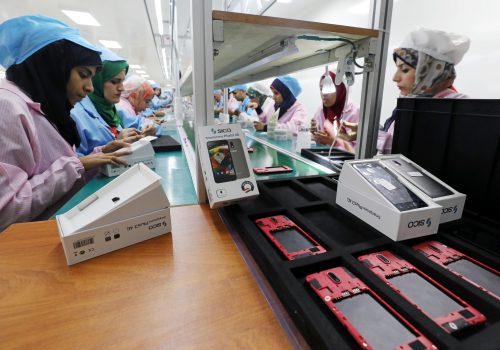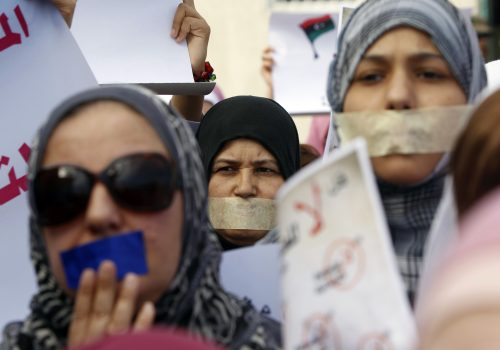The unlikely success of Egypt’s 2011 revolution: A revived women’s movement
There was a time when the women’s cause was not a priority for many Egyptians concerned about the country’s woes. Prior to the 2011 uprising, it was common to believe that all Egyptians outside the ruling circle and its allied elites were equally victimized by the corruption and injustices that prevailed under the three-decade rule of President Hosni Mubarak. The assumption was that if Egyptians fought the Mubarak regime’s corruption and brought about democracy, it would automatically smash the patriarchy—or so it was thought.
The experiences of the decade following the January 25th revolution has altered perceptions, with many Egyptians learning that they were wrong and that women in Egypt are underprivileged based on their gender. Egyptian women are vulnerable to sexism, misogyny, domestic violence, sexual harassment, discriminatory societal expectations, poverty as a single parent, and other issues. As a result, Egyptian women’s gender consciousness and society’s general awareness of the feminist cause have been growing.
This is not to say that gender consciousness or feminism are brand new or specific to the aftermath of the January 25th revolution. Egyptian feminists have struggled for women’s rights for more than a hundred years, from the early twentieth century’s nationalist female icons to the successive generation of mid-century feminists like Inji Aflatoun, Latifa Zayyat, and Doria Shafik. These women have continued to inspire generations of Egyptian feminists until today. However, what has been noticeable is a revival of a widespread feminist discourse since 2011—one that had witnessed a setback rather than a halt. This setback was caused by the rise of state feminism after the 1952 regime change, when the Egyptian state not only took the lead in adopting the women’s cause as part of nation-building—especially during the post-colonial Gamal Abdel Nasser era—but also silenced independent feminist voices.
Though there was relatively more room for independent feminists to organize during the Mubarak era, the state continued to deal with women’s rights as a governmental prerogative. Given how unpopular the Mubarak regime was in the years before the 2011 uprising, many Egyptians distrusted the government and whatever it stood for, causing skepticism to bleed over into women’s rights. Still, it is worth acknowledging the important work carried out by several feminist civil society organizations and initiatives that continuously strived to resist the regime’s restrictions.
Yet, what distinguishes the past decade from other parts of contemporary Egyptian history is the growing interest in women’s rights among broader segments of Egyptian society, including non-ideological women with little to no experience in political or social activism. This has occurred despite the general oppressive atmosphere that has cast a dark shadow over the January 25th revolution and its memory, particularly after the subsequent 2013 power grab by Abdel Fattah el-Sisi and the repression his regime unleashed.
For better or worse, revolutions, popular uprisings, and major protest movements rock the societies that make and live through them. They still result in multidimensional social changes that cannot be easily undone regardless of whether or not they succeed in ousting old regimes on the political level. Thus, there is a silver lining that can be seen with regard to Egypt’s women, particularly the rise of a progressive discourse on women’s rights and the spread of it in a way not seen prior to the January 25th revolution. Women who joined the eighteen days of protests in Cairo’s Tahrir Square in 2011—or watched other women do so—seemed to have discovered their shared, long-held grievances.
The aftermath of January 25th kicked off numerous grassroots women’s initiatives, many of which were spearheaded by young women with no prior experience in social or political organizing. They got together for numerous gender-specific causes, including: protecting the women-only passenger carriage on the metro train from male intruders; creating a mobile phone app that offers a live map of reported incidents of sexual harassment; writing shareable rebellious, feminist posts; and launching on social media a “performing arts project that documents and gives voice to censored art stories about gender in different communities in Egypt.” Although initiatives like these dwindled after the political crackdown following the 2013 coup, feminist voices continued to gain prominence and shape public discourse.
In recent years, in what has been often referred to as Egypt’s #MeToo movement, Egyptian women have increasingly spoken up against old and fresh incidents of harassment and sexual assault. A recent example is the 2020 high-profile exposure, subsequent arrest, and prosecution of a member of the country’s elite after a young woman created @assaultpolice. The Instagram account posted testimonies and evidence compiled from numerous women accusing a student that attended a prestigious university of rape and sexual assault. Shortly after, another campaign went viral on social media against a group of young men accused of gang-raping a girl at a luxurious hotel in 2014. The alleged assailants come from wealthy, well-connected families, which means that exposing them served as an act of defiance against the country’s centers of power.
The solidarity that these campaigns and others received from Egyptian women who never knew or met the victims has been enormous, revealing the sense of sisterhood among spontaneous feminists. Sympathetic men also expressed their support, with some paying a heavy price for it.
Some Egyptians might be understandably skeptical about the effectiveness of this latest feminist wave or whether there is a feminist wave at all. The past decade also saw the rise of a conservative anti-feminist campaign where feminism was criticized and ridiculed and where even the very word “feminism” (nasawiyya) was mocked and used by some as an insult. Angry voices are also advocating for traditional gender roles in households and viciously opposing any female behavior that does not align with the middle class’ social values and standards of respectability. After 2013, the state began to align with these standards and conservative attitudes, especially toward non-elitist women. For example, in 2020, two young women—possessing more than a million fans each on the video-sharing app TikTok—were recently charged with “violating family values” and “inciting debauchery.”
The conservative backlash against calls for improved women’s rights indicates that the pro-women campaign has been influential and far-reaching enough to make such forces feel threatened. It is not an unusual phenomenon and it should not be surprising. Similar backlashes accompanied progress throughout the history of the women’s movement inside Egypt and around the world. The suffragists of the early twentieth century were resisted by anti-suffragists and, just as the word nasawiyya has been ridiculed by some Egyptian conservatives in the past decade, feminism was a “dirty word” in 1960s and 1970s America—a time when feminists were stereotyped as angry and repugnant figures—according to feminist writer Susan J. Douglas. These pioneering feminists still achieved gains that are now taken for granted despite pushback from conservative voices.
The picture of the Egyptian women’s cause is not all rosy, but it is not entirely bleak either. The revolutionaries of 2011 should be proud of how the January 25th revolution has brought the women’s cause to the forefront of public debate, even under one of the most repressive regimes in modern Egyptian history. Defiant female voices are in the air—and they are significantly louder than they were prior to the 2011 uprising.
Sara Khorshid worked as a journalist and columnist in Egypt for fifteen years. Her articles have appeared in Foreign Policy, The New York Times, HuffPost, and numerous other outlets. She is currently writing her PhD in Canada’s Western University on the history of Egyptian-American mutual perceptions as represented in popular culture during the Cold War. Follow her on Twitter: @SaraKhorshid.
Image: Women chant slogans as they gather to protest against sexual harassment in front of the opera house in Cairo June 14, 2014, after a woman was sexually assaulted by a mob during the June 8 celebrations marking the new president Abdel Fattah al-Sisi's inauguration in Tahrir square. Egypt has asked YouTube to remove a video showing the naked woman with injuries being dragged through the square after being sexually assaulted during the celebrations. Authorities have arrested seven men aged between 15 and 49 for sexually harassing women on the square after the posting of the video, which caused an uproar in local and international media. REUTERS/Asmaa Waguih


